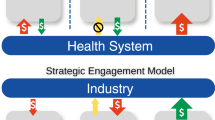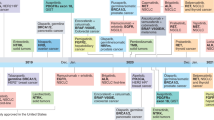Abstract
It was Hippocrates, the father of Western medicine, who first emphasized the patient as the most important determinant of therapeutic efficacy. Although the principle of adjusting treatment to specific patient characteristics has since been the strategy of physicians, this is undermined by a population-biased approach to drug development. Therefore, it is generally true to say that our current evidential approach to cancer treatment is driven more by drug-regulation requirements and market considerations than the specific needs of an individual patient. But, with cancer drug costs now spiraling out of control and the modest efficacy typically seen in patients, the community is again turning to Hippocrates' ancient paradigm—this time with emphasis on molecular considerations. Rapidly evolving technologies are empowering us to describe the molecular 'nature' of a patient and/or tumor and with this has come the beginning of truly personalized medicine, with maximized efficacy, cost effectiveness and hopefully improved survival for the patient.
This is a preview of subscription content, access via your institution
Access options
Subscribe to this journal
Receive 12 print issues and online access
$209.00 per year
only $17.42 per issue
Buy this article
- Purchase on Springer Link
- Instant access to full article PDF
Prices may be subject to local taxes which are calculated during checkout


Similar content being viewed by others
References
La Rosée, P. & Deininger, M. W. Resistance to imatinib: mutations and beyond. Semin. Hematol. 47, 335–343 (2010).
Gerber, D. E. & Minna, J. D. ALK inhibition for non-small cell lung cancer: from discovery to therapy in record time. Cancer Cell 14, 548–551 (2010).
Smalley, K. S. PLX-4032, a small-molecule B-Raf inhibitor for the potential treatment of malignant melanoma. Curr. Opin. Investig. Drugs 11, 699–706 (2010).
Jackson, D. B. Molecular perspectives on the non-responder phenomenon. Drug Discov. Today 14, 373–379 (2009).
Hayes, D. F. Bevacizumab treatment for solid tumors: boon or bust? JAMA 305, 506–508 (2011).
Fojo, T. & Parkinson, D. R. Biologically targeted cancer therapy and marginal benefits: are we making too much of too little or are we achieving too little by giving too much? Clin. Cancer Res. 16, 5972–5980 (2010).
Fojo, T. & Grady, C. How much is life worth: cetuximab, non-small cell lung cancer, and the $440 billion question. J. Natl Cancer Inst. 101, 1044–1048 (2009).
Jackson, D. B. Clinical and economic impact of the nonresponder phenomenon—implications for systems based discovery. Drug Discov. Today 14, 380–385 (2009).
Druker, B. J. et al. Activity of a specific inhibitor of the BCR-ABL tyrosine kinase in the blast crisis of chronic myeloid leukemia and acute lymphoblastic leukemia with the Philadelphia chromosome. N. Engl. J. Med. 344, 1038–1042 (2001).
Druker, B. J. et al. Efficacy and safety of a specific inhibitor of the BCR-ABL tyrosine kinase in chronic myeloid leukemia. N. Engl. J. Med. 44, 1031–1037 (2001).
Mok, T. S. Personalized medicine in lung cancer: what we need to know. Nat. Rev. Clin. Oncol. doi:10.1038/nrclinonc.2011.126.
Ribas, A. & Flaherty, K. T. BRAF targeted therapy changes the treatment paradigm in melanoma. Nat. Rev. Clin. Oncol. 8, 426–433 (2011).
Kopetz, S. et al. PLX4032 in metastatic colorectal cancer patients with mutant BRAF tumors [abstract]. J. Clin. Oncol. 28 (Suppl.), a3534 (2010).
Xia, G. et al. EphB4 receptor tyrosine kinase is expressed in bladder cancer and provides signals for cell survival. Oncogene 25, 769–780 (2006).
Davalos, V. et al. EPHB4 and survival of colorectal cancer patients. Cancer Res. 66, 8943–8948 (2006).
Medco®. Drug Trend Report [online], (2010).
Chabner, B. A. & Roberts, T. G. Jr. Timeline: Chemotherapy and the war on cancer. Nat. Rev. Cancer 5, 65–72 (2005).
Cohen, H. Drug Topics Red Book 112th edn (Thomson Healthcare, New Jersey, 2008).
Kim, P. Cost of cancer care: The patient perspective. J. Clin. Oncol. 25, 228–232 (2007).
Himmelstein, D. U., Thorne, D., Warren, E. & Woolhandler, S. Medical bankruptcy in the United States, 2007: results of a national study. Am. J. Med. 122, 741–746 (2009).
Antoni, M. H. et al. The influence of bio-behavioural factors on tumour biology: pathways and mechanisms. Nat. Rev. Cancer 6, 240–248 (2006).
Meropol, N. J. et al. American Society of Clinical Oncology guidance statement: the cost of cancer care. J. Clin. Oncol. 27, 3868–3874 (2009).
US Census Bureau. USA QuickFacts from the US Census Bureau [online], (2011).
Bergsland, E. & Dickler, M. N. Maximizing the potential of bevacizumab in cancer treatment. Oncologist 9 (Suppl. 1), 36–42 (2004).
Kelly, W. K. et al. A randomized, double-blind, placebo-controlled phase III trial comparing docetaxel, prednisone, and placebo with docetaxel, prednisone, and bevacizumab in men with metastatic castration-resistant prostate cancer (mCRPC): Survival results of CALGB 90401 [abstract]. J. Clin. Oncol. 28 (Suppl.), LBA4511 (2010).
Kindler, H. L. et al. Gemcitabine plus bevacizumab compared with gemcitabine plus placebo in patients with advanced pancreatic cancer: phase III trial of the Cancer and Leukemia Group B (CALGB 80303). J. Clin. Oncol. 28, 3617–3622 (2010).
Van Cutsem, E. et al. Phase III trial of bevacizumab in combination with gemcitabine and erlotinib in patients with metastatic pancreatic cancer. J. Clin. Oncol. 27, 2231–2237 (2009).
Hurwitz, H. et al. Bevacizumab plus irinotecan, fluorouracil, and leucovorin for metastatic colorectal cancer. N. Engl. J. Med. 350, 2335–2342 (2004).
Saltz, L. B. et al. Bevacizumab in combination with oxaliplatin-based chemotherapy as first-line therapy in metastatic colorectal cancer: a randomized phase III study. J. Clin. Oncol. 26, 2013–2019 (2008).
Friedman, H. S. et al. Bevacizumab alone and in combination with irinotecan in recurrent glioblastoma. J. Clin. Oncol. 27, 4733–4740 (2009).
Sandler, A. et al. Paclitaxel-carboplatin alone or with bevacizumab for non-small-cell lung cancer. N. Engl. J. Med. 355, 2542–2550 (2006).
Reck, M. et al. Phase III trial of cisplatin plus gemcitabine with either placebo or bevacizumab as first-line therapy for nonsquamous non-small-cell lung cancer: AVAiL. J. Clin. Oncol. 27, 1227–1234 (2009).
Reck, M. et al. Overall survival with cisplatin gemcitabine and bevacizumab or placebo as first-line therapy for nonsquamous non-small-cell lung cancer: Results from a randomised phase III trial (AVAiL). Ann. Oncol. 21, 1804–1809 (2010).
Rini, B. I. et al. Phase III trial of bevacizumab plus interferon alfa versus interferon alfa monotherapy in patients with metastatic renal cell carcinoma: final results of CALGB 90206. J. Clin. Oncol. 28, 2137–2143 (2010).
Rini, B. I. et al. Bevacizumab plus interferon alfa compared with interferon alfa monotherapy in patients with metastatic renal cell carcinoma: CALGB 90206. J. Clin. Oncol. 26, 5422–5428 (2008).
Roche. European medical advisory committee does not recommend approval of Avastin for deadly form of brain cancer [online], (2009).
Miller, K. et al. Paclitaxel plus bevacizumab versus paclitaxel alone for metastatic breast cancer. N. Engl. J. Med. 357, 2666–2676 (2007).
Burstein, H. J. Avastin, ODAC, and the FDA: are we drafting the right players? J. Natl Compr. Canc. Netw. 8, 833–834 (2010).
Miles, D. W. et al. Phase III study of bevacizumab plus docetaxel compared with placebo plus docetaxel for the first-line treatment of human epidermal growth factor receptor 2-negative metastatic breast cancer. J. Clin. Oncol. 28, 3239–3247 (2010).
Robert, N. J. et al. RIBBON-1: Randomized, double-blind, placebo-controlled, phase III trial of chemotherapy with or without bevacizumab (B) for first-line treatment of HER2-negative locally recurrent or metastatic breast cancer (MBC) [abstract 1005]. J. Clin. Oncol. 27 (Suppl. 15), 42S (2009).
Couzin-Frankel, J. & Ogale, Y. FDA. Once on 'fast track,' avastin now derailed. Science 333, 143–144 (2011).
Cohn, D. E., Kim, K. H., Resnick, K. E., O'Malley, D. M. & Straughn, J. M. Jr. At what cost does a potential survival advantage of bevacizumab make sense for the primary treatment of ovarian cancer? A cost-effectiveness analysis. J. Clin. Oncol. 29, 1247–1251 (2011).
Burger, R. A. et al. Phase III trial of bevacizumab (BEV) in the primary treatment of advanced epithelial ovarian cancer (EOC), primary peritoneal cancer (PPC), or fallopian tube cancer (FTC): A Gynecologic Oncology Group study [abstract]. J. Clin. Oncol. 28 (Suppl. 18), LBA1 (2010).
Hensley, M. L. Big costs for little gain in ovarian cancer. J. Clin. Oncol. 29, 1230–1232 (2011).
Munro, A. J. & Niblock, P. G. Cancer research in the global village. 376, 659–660 (2010).
Bang, Y. J. et al. Trastuzumab in combination with chemotherapy versus chemotherapy alone for treatment of HER2-positive advanced gastric or gastro-oesophageal junction cancer (ToGA): a phase 3, open-label, randomised controlled trial. Lancet 376, 687–897 (2010).
Meropol, N. J. & Schulman, K. A. Cost of cancer care: issues and implications. J. Clin. Oncol. 25, 180–186 (2007).
Doloresco, F. et al. Projecting future drug expenditures: 2011. Am. J. Health Syst. Pharm. 68, 921–932 (2011).
Ranpura, V., Hapani, S. & Wu, S. Treatment-related mortality with bevacizumab in cancer patients: a meta-analysis. JAMA 305, 487–494 (2011).
Karapetis, C. S. et al. K-ras mutations and benefit from cetuximab in advanced colorectal cancer. N. Engl. J. Med. 359, 1757–1765 (2008).
Allegra, C. J. et al. American Society of Clinical Oncology provisional clinical opinion: testing for KRAS gene mutations in patients with metastatic colorectal carcinoma to predict response to anti-epidermal growth factor receptor monoclonal antibody therapy. J. Clin. Oncol. 27, 2091–2096 (2009).
Perlroth, D. J., Goldman, D. P. & Garber, A. M. The potential impact of comparative effectiveness research on U.S. health care expenditures. Demography 47 (Suppl.), S173–S190 (2010).
Chung, K. Y. et al. Cetuximab shows activity in colorectal cancer patients with tumors that do not express the epidermal growth factor receptor by immunohistochemistry. J. Clin. Oncol. 23, 1803–1810 (2005).
Murukesh, N., Dive, C. & Jayson, G. C. Biomarkers of angiogenesis and their role in the development of VEGF inhibitors. Br. J. Cancer 102, 8–18 (2010).
US Department of Health and Human Services. Table of Pharmacogenomic Biomarkers in Drug Labels [online], (2011).
Weinstein, I. B. Cancer. Addiction to oncogenes–the Achilles heal of cancer. Science 297, 63–64 (2002).
Davey, J. W. et al. Genome-wide genetic marker discovery and genotyping using next-generation sequencing. Nat. Rev. Genet. 12, 499–510 (2011).
Stratton, M. R., Campbell, P. J. & Futreal, P. A. The cancer genome. Nature 458, 719–724 (2009).
Kim, E. S. et al. The BATTLE trial: personalizing therapy for lung cancer. Cancer Discov. 1, 44–53 (2011).
US Department of Health and Human Sciences. Centers for Medicare & Medicaid Services [online], (2009).
Picker, A. & Jackson, D. B. Genetic determinants of anticancer drug activity: towards a global approach to personalized cancer medicine. Expert Rev. Mol. Diagn. 11, 567–577 (2011).
Adams, F. The Genuine Works of Hippocrates (Baillière, Tindall, & Cox, London, 1939).
Kang, Y. et al. AVAGAST: A randomized, double-blind, placebo-controlled, phase III study of first-line capecitabine and cisplatin plus bevacizumab or placebo in patients with advanced gastric cancer (AGC) [abstract]. J. Clin. Oncol. 28 (Suppl. 18), LBA4007 (2010).
US Department of Health and Human Services. AHRQ Agency for Healthcare Research and Quality [online], (2011).
Acknowledgements
Portions of work presented here were supported by grants from the NIH (CA109298, CA110793, CA083639, CA098258 and U54 CA151668), Department of Defense (OC073399, OC093146 and BC085265), a Program Project Development Grant from the Ovarian Cancer Research Fund, the Marcus Foundation, the Gynecologic Cancer Foundation, the Blanton–Davis Ovarian Cancer Research Program, the RGK Foundation, the Laura and John Arnold Foundation, and the Betty Ann Asche Murray Distinguished Professorship.
Author information
Authors and Affiliations
Contributions
Both authors contributed to researching data, writing, editing and reviewing this article.
Corresponding author
Ethics declarations
Competing interests
D. B. Jackson is an employee of LIFE Biosystems. A. K. Sood declares no competing interests.
Rights and permissions
About this article
Cite this article
Jackson, D., Sood, A. Personalized cancer medicine—advances and socio-economic challenges. Nat Rev Clin Oncol 8, 735–741 (2011). https://doi.org/10.1038/nrclinonc.2011.151
Published:
Issue Date:
DOI: https://doi.org/10.1038/nrclinonc.2011.151
This article is cited by
-
Unsolved challenges of clinical whole-exome sequencing: a systematic literature review of end-users’ views
BMC Medical Genomics (2016)
-
Gesundheitsökonomische Aspekte einer stratifizierten Medizin in der rheumatoiden Arthritis
Zeitschrift für Rheumatologie (2013)
-
Influence of Pharmacogenomic Profiling Prior to Pharmaceutical Treatment in Metastatic Colorectal Cancer on Cost Effectiveness
PharmacoEconomics (2013)



